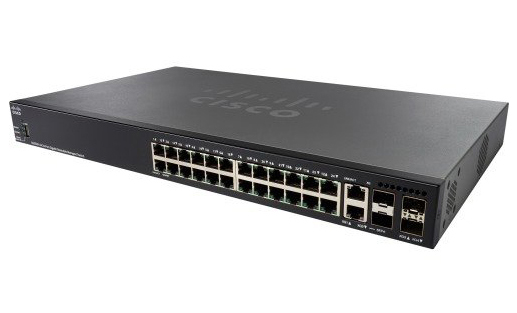Thông Số Kỹ Thuật SG350X-24-K9-EU
| Model | SG350X-24-K9-EU |
| Performance | |
| Switching capacity and forwarding rate | Capacity in Mpps (64-byte packets): 95.23 |
| Switching capacity (Gbps): 128 | |
| Layer 2 switching | |
| Spanning Tree Protocol | Standard 802.1d spanning tree support Fast convergence using 802.1w (Rapid Spanning Tree Protocol [RSTP]), enabled by default Multiple spanning tree instances using 802.1s (MSTP); 8 instances are supported Per-VLAN Spanning Tree Plus (PVST+); 126 instances are supported Rapid PVST+ (RPVST+); 126 instances are supported |
| Port grouping and link aggregation | Support for IEEE 802.3ad Link Aggregation Control Protocol (LACP) – Up to 8 groups – Up to 8 ports per group with 16 candidate ports for each (dynamic) 802.3ad LAG |
| VLAN | Support for up to 4094 active VLANs simultaneously; port-based and 802.1Q tag-based VLANs; MAC-based VLAN Management VLAN Private VLAN with promiscuous, isolated, and community port Guest VLAN, unauthenticated VLAN, protocol-based VLAN, IP subnet-based VLAN, CPE VLAN Dynamic VLAN assignment using RADIUS server along with 802.1X client authentication |
| Voice VLAN | Voice traffic is automatically assigned to a voice-specific VLAN and treated with appropriate levels of QoS. Auto voice capabilities deliver networkwide zero-touch deployment of voice endpoints and call control devices |
| Multicast TV VLAN | Multicast TV VLAN allows the single multicast VLAN to be shared in the network while subscribers remain in separate VLANs. This feature is also known as Multicast VLAN Registration (MVR) |
| VLAN translation | Support for VLAN One-to-One Mapping. In VLAN One-to-One Mapping, on an edge interface, Customer VLANs (C-VLANs) are mapped to service provider VLANs (S-VLANs) and the original C-VLAN tags are replaced by the specified S-VLAN |
| Q-in-Q | VLANs transparently cross over a service provider network while isolating traffic among customers |
| Selective Q-in-Q | Selective Q-in-Q is an enhancement to the basic Q-in-Q feature and provides, per edge interface, multiple mappings of different C-VLANs to separate S-VLANs Selective Q-in-Q also allows configuration of the EtherType (TPID) of the S-VLAN tag Layer 2 protocol tunneling over Q-in-Q is also supported |
| GVRP/GARP | Generic VLAN Registration Protocol (GVRP) and Generic Attribute Registration Protocol (GARP) enable automatic propagation and configuration of VLANs in a bridged domain |
| UDLD | Unidirectional Link Detection (UDLD) monitors physical connections to detect unidirectional links caused by incorrect wiring or port faults to prevent forwarding loops and blackholing of traffic in switched networks |
| DHCP relay at Layer 2 | Relay of DHCP traffic to a DHCP server in a different VLAN. Works with DHCP option 82 |
| IGMP (versions 1, 2, and 3) snooping | Internet Group Management Protocol (IGMP) limits bandwidth-intensive multicast traffic to only the requesters; it supports 4000 multicast groups (source-specific multicasting is also supported) |
| IGMP querier | Used to support a Layer 2 multicast domain of snooping switches in the absence of a multicast router |
| HOL blocking | Head-Of-Line (HOL) blocking |
| Layer 3 | |
| IPv4 routing | Wirespeed routing of IPv4 packets Up to 990 static routes and up to 128 IP interfaces |
| Wirespeed IPv6 static routing | Up to 245 static routes and up to 106 IPv6 interfaces |
| Layer 3 interface | Configuration of Layer 3 interface on physical port, LAG, VLAN interface, or loopback interface |
| CIDR | Support for Classless Interdomain Routing (CIDR) |
| DHCP server | Switch functions as an IPv4 DHCP server serving IP addresses for multiple DHCP pools and scopes Support for DHCP options |
| DHCP relay at Layer 3 | Relay of DHCP traffic across IP domains |
| User Datagram Protocol (UDP) relay | Relay of broadcast information across Layer 3 domains for application discovery or relaying of BOOTP/DHCP packets |
| Stacking | |
| Hardware stack | Up to four units in a stack. Up to 208 ports managed as a single system with hardware failover |
| High availability | Fast stack failover delivers minimal traffic loss. Supports link aggregation across multiple units in a stack |
| Plug-and-play stacking configuration and management | Master and backup for resilient stack control Auto-numbering Hot swap of units in stack Ring and chain stacking options, auto-stacking port speed, flexible stacking port options |
| High-speed stack interconnects | Cost-effective high-speed 10G fiber and copper interfaces. Support LAG as stacking interconnects for even higher bandwidth |
| Hybrid stack | A mix of SG350X, SG350XG, and SX350X switches in the same stack (Gigabit and 10 Gigabit Ethernet) |
| Security | |
| SSH | Secure Shell (SSH) is a secure replacement for Telnet traffic. Secure Copy (SCP) also uses SSH. SSH versions 1 and 2 are supported |
| SSL | Secure Sockets Layer (SSL) encrypts all HTTPS traffic, allowing secure access to the browser-based management GUI in the switch |
| IEEE 802.1X (authenticator role) | RADIUS authentication and accounting, MD5 hash, guest VLAN, unauthenticated VLAN, single- and multiple-host mode, and single and multiple sessions Supports time-based 802.1X dynamic VLAN assignment |
| IEEE 802.1X supplicant | A switch can be configured to act as a supplicant to another switch. This enables extended secure access in areas outside the wiring closet (such as conference rooms) |
| Web-based authentication | Web-based authentication provides Network Admission Control (NAC) through a web browser to any host devices and operating systems |
| Quality of service | |
| Priority levels | 8 hardware queues |
| Scheduling | Strict priority and Weighted Round-Robin (WRR) |
| Class of service | Port based; 802.1p VLAN priority based; IPv4/v6 IP precedence, Type of Service (ToS), and DSCP based; DiffServ; classification and remarking ACLs, trusted QoS Queue assignment based on Differentiated Services Code Point (DSCP) and class of service (802.1p/CoS) |
| Rate limiting | Ingress policer; egress shaping and ingress rate control; per VLAN, per port, and flow based; Two-Rate Three-Color (2R3C) policing |
| Congestion avoidance | A TCP congestion avoidance algorithm is required to minimize and prevent global TCP loss synchronization |
| iSCSI traffic optimization | A mechanism for giving priority to SCSI over IP (iSCSI) traffic over other types of traffic |
| Power over Ethernet | |
| Power dedicated to PoE | 195W |
| Number of ports that support PoE | 24 (4 support 60W PoE) |
| Power consumption (worst case) | |
| Green power (mode) | EEE, Energy Detect, Short Reach |
| System power consumption | 110V=48.8W 220V=49.3W |
| Power consumption (with PoE) | 110V=268.3W 220V=258.8W |
| Heat dissipation (BTU/hr) | 915.5 |
| General | |
| Total system ports | 24x 1G + 4x 10G |
| Network ports | 24x 1G |
| Uplink ports | 2x 10G copper/SFP+ combo + 2x SFP+ |
| Console port | Cisco standard RJ-45 console port |
| OOB management port | Dedicated Gigabit Ethernet management port for Out-Of-Band (OOB) management on SG350XG and SX350X models |
| USB slot | USB Type A slot on the front panel of the switch for easy file and image management |
| Buttons | Reset button |
| Cabling type | UTP Category 5 or better; fiber options (Single-Mode Fiber [SMF] and Multimode Fiber [MMF]); coaxial SFP+ |
| LEDs | System, master, stack ID, link/speed per port |
| Flash | 256 MB |
| CPU | 1.3-GHz and 800-MHz (dual-core) ARM |
| CPU memory | 512 MB |
| Packet buffer | 1.5 MB |
| Environmental | |
| Unit dimensions (W x H x D) | 440 x 44 x 350 mm |
| Unit weight | 4.93 kg |
| Power | 100 to 240V 47 to 63 Hz, internal, universal |
| Certification | UL (UL 60950), CSA (CSA 22.2), CE mark, FCC Part 15 (CFR 47) Class A |
| Operating temperature | 0° to 50°C |
| Storage temperature | -20° to 70°C |
| Operating humidity | 10% to 90%, relative, noncondensing |
| Storage humidity | 10% to 90%, relative, noncondensing |




Đánh giá